Iran Guard's General Repeats Warning To Azerbaijan
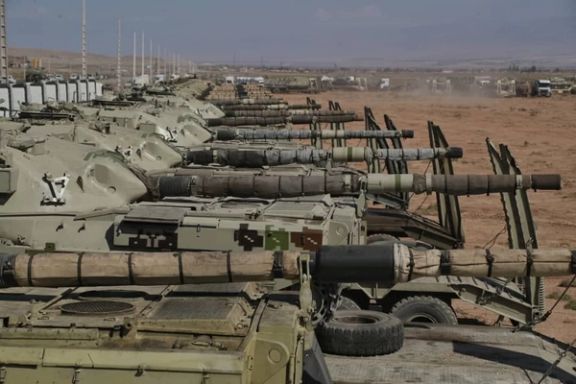
The ideology chief of the Revolutionary Guard has said that Iran will not allow “Takfiris or Zionist terrorists” to create a “nest” at its northwestern borders.

The ideology chief of the Revolutionary Guard has said that Iran will not allow “Takfiris or Zionist terrorists” to create a “nest” at its northwestern borders.
In recent weeks tensions have increased between the Islamic Republic and its northern neighbor Azerbaijan, with Iran accusing Baku of harboring Israeli and jihadist elements on its territory and attempting to change borders at the expense of Armenia.
General Rasul Sanaeirad, who is a deputy commander of the Islamic Revolution Guard Corps (IRGC) in charge of ideology said that Iran has been careful not to instigate conflicts and tensions over the years, but it had to conduct military drills last week to send a message.
Iran massed large number of troops and weapons near the Azerbaijani borders and held drills, citing exercises by Azerbaijan, Turkey and Pakistan near its borders.
Sanaeirad added that the military drills also send a message to “powers behind the scenes” who were instigating tensions. He did not name those countries.
He added, “Iran opposes any kind of geopolitical changes in the region and regards as important the security, territorial integrity and the rights of its neighbors.”
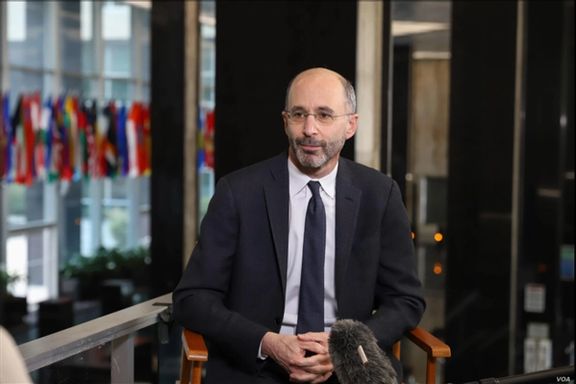
US Special Envoy for Iran held spoke Thursday with a South Korean diplomat to discuss cooperation over negotiations to restore the 2015 Iran nuclear deal.
The South Korean news agency Yonhap issued a brief report on Robert Malley’s discussion with First Vice Foreign Minister Choi Jong-Kun but provided no details about how South Korea can help in the process of talks with Tehran.
Two South Korean banks hold $7 billion of Iran’s funds from the time when Seoul was purchasing oil from Tehran before full US sanctions on Iran’s crude exports were imposed in May 2019.
Iran has been hinting that the United States should release frozen Iranian funds before it returns to the talks. Iran’s Foreign Minister Hossein Amir-Abdollahian told Iranian state television on October 2 that he refused overtures to meet with US officials while he was attending the UN General Assembly in New York in September, asking that Washington should first unfreeze $10 billion.
It is not clear if Malley’s conversation with the South Korean diplomat was related to the issue of the frozen funds, or whether the US intends to release them to convince Iran to return to the Vienna negotiations. Malley asked for South Korea to play a “constructive” role in efforts to resume the negotiations.
However, Choi reiterated South Korea’s willingness to provide support necessary for the resumption of the nuclear talks "in consideration of the importance of Seoul-Tehran relations,” Yonhap quoted the foreign ministry as saying.
Iran left the Vienna multilateral nuclear talks aimed at restoring the 2015 nuclear deal, JCPOA, in June, saying its new president needed time to form a government, but has so far not set a date for its return.
The United States, the United Kingdom, France and Germany that have been negotiating with Iran since April have warned that time is running out for fruitful talks as Iran continues to enrich uranium and advances its nuclear program that would make the revival of the agreement impossible.
Washington and its European allies have said they will make no new concession to Tehran until it returns to the talks based on what has so far been offered by the West.
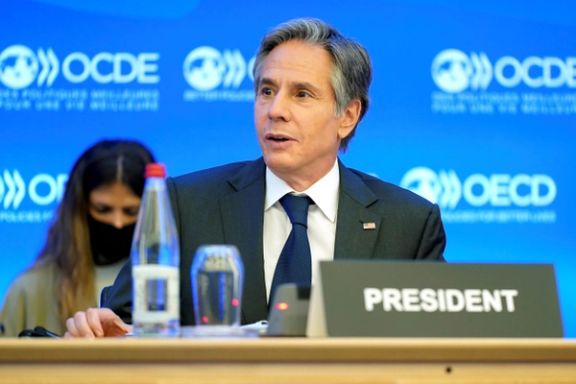
US Secretary of State Antony Blinken has again warned in Paris that time is running out for reaching an agreement on restoring the nuclear agreement with Iran.
Blinken said on Wednesday that he has spoken with his Russian counterpart, Sergei Lavrov, on restoring Iran's nuclear deal with the world powers and that Moscow and Washington had a shared interest restarting talks as soon as possible.
"We had an opportunity to compare notes on where we stand and where we hope to go," Blinken said at a news conference.
Lavrov said that talks to restore the deal "should be resumed as soon as possible." But Lavrov stressed that the world wants the US to “return to the obligations of the nuclear deal” and in reference to US sanctions, stop the "illegal restrictions on Iran and all of its trading partners," he said.
"The United States and Russia, I think, (are) sharing an interest in seeing a mutual return to compliance with the JCPOA … We had an opportunity to compare notes on where we stand, and where we hope to go," Blinken said at a press conference in Paris.

The military adviser to Supreme Leader Ali Khamenei warned Wednesday that Iran would not accept “any bordering country” hosting "anti-Iran terrorist groups."
“We warn that we will deal with counter-revolutionary groups anywhere on the borders around our country, where governments host them and provide them with facilities and weapons,” Major-General Yahya Rahim-Safavi told Defa Press, news agency of the Iranian Armed Forces.
Rahim-Safavi, a former commander-in-chief of the Revolutionary Guards (IRGC), called in particular on the Kurdistan Regional Government (KRG) in Iraq not to allow bases for such groups.
In recent days, Iran has also been warning neighboring Azerbaijan about what it alleges are foreign jihadist groups near its borders. The accusation goes back to last year's Armenia-Azerbaijan conflict when reports emerged of Arab Sunni militants fighting on the Azerbaijani side.
Several Iranian Kurdish parties committed to autonomy − including the Kurdistan Democratic Party of Iran (KDPI), Komala and Pejak (the Free Life Party of Kurdistan) − have bases in northern Iraq with varying degrees of tolerance from the Iraqi Kurdish authorities and parties.
On Monday, Foreign Ministry Spokesman Saeed Khatibzadeh said Iran had lost “strategic patience,” and that both the KRG and the Baghdad government needed to shut down, in accordance with international law, bases where "armed grouplets train to attack Iran."
Other officials including Major-General Mohammad Bagheri (Baqeri), chairman of the Iranian Chiefs of Staff, and Intelligence Minister Esmail Khatib have issued similar warnings to the KRG in recent weeks.
Iran's armed forces have for decades carried out cross-border attacks on Iranian Kurdish groups in northern Iraq, sometimes prompting the Iraqi Kurdish parties to restrict their activities. The Iranian Kurdish parties have carried out sporadic attacks while concentrating on maintaining a presence inside Iranian Kurdistan.
In June Iran and Turkey conducted joint operations against forces of the Kurdistan Workers Party (PKK) and its Iranian affiliate, Pejak, in Kurdish Iraq. Iran also bombarded the positions of other Kurdish groups, including the KDPI and Komala.
Iran used combat drones and artillery September 9-10 in repeating these attacks. This came three days after General Mohammad Pakpour, commander of IRGC Ground Forces, had complained to Erbil and Baghdad over the freedom of movement of Kurdish fighters near the border and warned civilians to keep away from the groups’ headquarters to avoid danger.
The Iraqi army chief of staff Abdul Amir Rashid Yarallah on September 21 called Iranian claims over the Kurdish groups “unjustified” and insisted Baghdad “strongly rejects the use of its territory for aggression against its neighbors.” Yarallah asked “everyone to adhere to the language of brotherhood and cooperation in joint relations.”
Iran has options for escalation. Three years ago it fired ballistic missiles at the KDPI headquarters in Koysanjak, northern Iraq, killing at least 16.
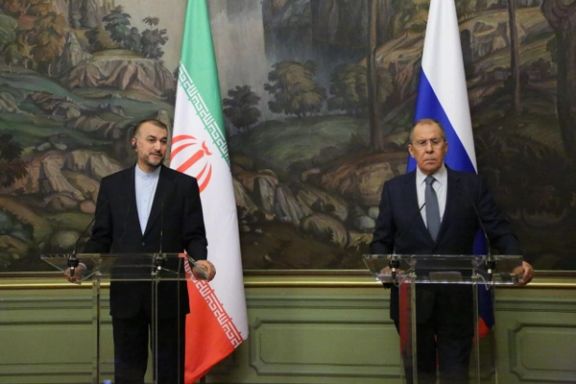
The Iranian and Russian foreign ministers held wide-ranging talks in Moscow, covering bilateral cooperation, regional tensions and Iran’s nuclear talks.
Iranian Foreign Minister Hossein Amir-Abdollahian said Iran and Russia should work towards improving their relationship.
"Our viewpoints are very common and close to each other. A major part of the time of our talks was spent on bilateral issues. We agreed on working up a comprehensive strategic document on the cooperation between the two countries in near future," Amir-Aabdollahian said at a press conference with Russian Foreign Minister Sergey Lavrov in Moscow on Wednesday.
Russia has been Iran’s diplomatic supporter and a military ally in Syria where Russian air power and Iran-backed forces helped largely defeat opponents of Bashar al-Assad.
On Azerbaijan, he said Iran discussed its concerns with Lavrov. "We believe the region cannot tolerate new excessive demands," the Iranian foreign minister told reporters.
Tensions have risen between Iran and the Republic of Azerbaijan in recent weeks as Baku has hampered Iranian trucks traveling north in a small patch of territory it controls. Tehran has lashed back with military drills on the border and accusations that Baku has allowed Israel to establish a presence near its borders.
Amir-Abdollahian expressed concern over what he said was Israel’s presence and influence in neighboring Azerbaijan.
The two sides also discussed Iran’s talks with world powers over its nuclear program that Tehran has suspended since June. Lavrov echoing Western calls said that the nuclear negotiations in the "Vienna format" should be resumed "as soon as possible".
Washington pulled out of the deal unilaterally in 2018 under US President Donald Trump, but successor Joe Biden has indicated that the US would be willing to rejoin.
But there are complications. Iran has been steadily violating the restrictions of the deal, like the amount of enriched uranium it can stockpile and the purity to which it can enrich it. Lavrov also urged closer cooperation between Iran and the International Atomic Energy Agency.
On the settlement in the Caucasian region, Lavrov said Moscow was discussing the so-called 3+3 format.
"We discussed an initiative to create the format 3+3: three Transcaucasian countries and three big neighbors - Russia, Iran and Turkey. Iranian friends have a positive view regarding this initiative, and we can see the same feeling in Azerbaijan and Turkey," Lavrov said.
"We work with our Armenian colleagues. We believe that Georgia, despite all the problems it faces, will be interested in such a mechanism of consultations," Lavrov added.
Russia brokered a peace deal between Armenian and Azerbaijan last November, ending last year's six-week war with Azerbaijan.
The deal ceded large swathes of territory in Azerbaijan that had been controlled by Armenian forces since 1994 and was a severe blow to Armenian nationalists' pride.
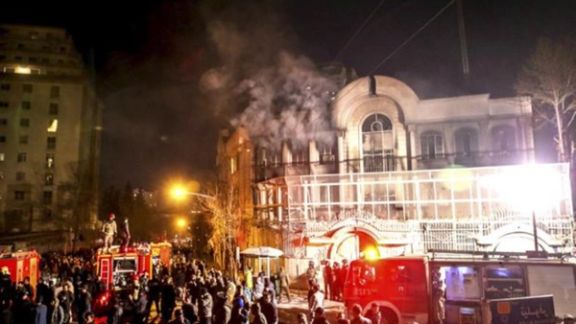
Arabic Post claims Saudi Arabia and Iran are well into preparations for the mutual reopening of embassies and consulates, which have been closed since 2016.
The London-based news site cited an “Iraqi diplomatic source” and “Iranian sources.” The latter, said Arabic Post, claimed Saudi Arabia had sent a team to Iran to renovate and update security and technical systems in its Tehran embassy and Mashhad consulate, and that Iran had sent a security delegation to prepare its Riyadh embassy and Jeddah consulate to for re-opening.
Arabic Post also claimed its Iranian sources had confirmed that managing talks with Saudi Arabia had been transferred from the foreign ministry to the Supreme National Security Council and its secretary, Ali Shamkhani.
Riyadh closed its embassy and cut diplomatic ties with Iran in 2016 after protestors stormed the Saudi embassy in Tehran in protest at the Saudis executing 47 dissidents including leading Shi'ite cleric Sheikh Nimr al-Nimr.
Foreign Ministry Spokesman Saeed Khatibzadeh declined to confirm Monday that a Saudi delegation would be visiting Tehran to prepare the embassy.
4th round of talks
Saudi Arabia announced Sunday it had held September 21 its direct talks with the new government of President Ebrahim Raisi (Raeesi). This was the fourth round of Iraqi-brokered talks that began in Baghdad in April as Iran also opened talks with world powers in Vienna over reviving its 2015 nuclear deal, the JCPOA (Joint Comprehensive Plan of Action) from which the US withdrew in 2018.
In a press conference in Riyadh with European Union foreign policy chief Josep Borrell October, Saudi Foreign Minister Prince Faisal bin Farhan al-Saud said discussions were at an exploratory stage: “We hope they will provide a basis to address unresolved issues between the two sides and we will strive and work to realize that.”
Prince Faisal reiterated Saudi concerns over Iran’s "transgressions" in its nuclear program. Iran in turn called for Riyadh to open its nuclear sites to full inspections by the International Atomic Energy Agency (IAEA).
Iran has not commented specifically on the latest round of meetings, although the spokesman Khatibzadeh described talks with Saudi Arabia as "optimal" Monday and said neither side had set preconditions.
Raisi priority
Raisi and his foreign policy team have several times emphasized a priority in improving relations with regional countries. The challenge with Saudi Arabia lies in overcoming rivalries in Iraq, Syria, Lebanon, and Yemen, where Riyadh and Tehran are allied with rival or warring parties. Official of both countries have recently cautiously expressed optimism over normalizing diplomatic relations.
Several world powers have welcomed Saudi-Iran talks. Riyadh this year became a dialogue partner of the Shanghai Cooperation Organization, which Tehran is now joining as a full member. While allied with Iran in supporting Syria’s President Bashar al-Assad, Russia has recently reached a military agreement with Saudi Arabia, while China is a major oil customer of both Iran and Saudi Arabia.
The US Special Envoy for Iran Robert Malley tweeted Monday welcoming Saudi Arabia’s “announcement of direct talks” with Iran, expressing hope that dialogue would “contribute to de-escalation of tensions & address long-standing regional concerns,” and suggesting “full, mutual return [of Iran and the US] to JCPOA would support these regional efforts.”
The British Ambassador to Iraq, Mark Bryson, in a meeting with Iraqi National Security Adviser Qassem al-Araji Tuesday said London welcomed the dialogue and expressed hope it would expand to include all regional countries.